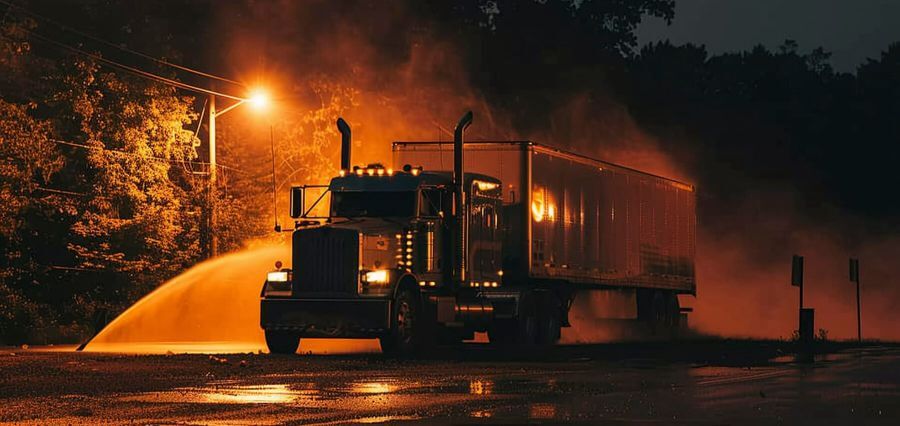Truck accidents can be devastating, often resulting in severe injuries, property damage, and even fatalities. Due to the measurements of commercial trucks, collisions with them typically have more severe consequences than passenger vehicle accidents. In Grand Rapids, Michigan, understanding truck accident liability is critical if you’re involved in such an accident and seeking fair compensation. Several factors, including multiple potentially liable parties, unique regulations, and complex insurance policies, make truck accident cases particularly challenging.
To better navigate these complexities, consulting with an experienced truck accident lawyer in Grand Rapids, who can help determine liability, gather evidence, and secure the compensation you deserve, is often beneficial. Let’s explore the critical elements of truck accident liability in Michigan and what you should know if you’re pursuing a claim.
Common Causes of Truck Accidents
Understanding what causes truck accidents is essential to determining liability. Truck accidents often occur from a combination of factors, including:
- Driver fatigue: Truck drivers are frequently pressured to meet tight deadlines, leading to long hours and potential fatigue. Despite regulations limiting drive time, fatigue remains a common cause of accidents.
- Poor maintenance: Large trucks require regular maintenance for safe operation. Neglected maintenance can often lead to serious accidents, including brake failures, tire blowouts, or steering malfunctions.
- Improper loading: Overloaded or improperly balanced cargo can make trucks challenging to control and lead to rollover accidents, putting other drivers at risk.
- Distracted driving: Like any driver, truck operators can be distracted by mobile devices, in-cabin systems, or fatigue-induced inattention.
These factors can contribute to a trucking accident, and comprehending the reason is a critical first step toward establishing liability.
Determining Liability in Truck Accidents
Liability in truck accidents is often more complex than in standard car accidents due to the involvement of multiple parties. A single accident may result in shared liability among several entities, including:
- Truck driver: If the accident is produced by negligent driving, such as speeding, distracted driving, or ignoring safety protocols, the driver can be held liable.
- Trucking company: In many cases, the trucking company that employs the driver is also responsible, especially if it fails to comply with safety regulations, forces drivers to exceed legal driving hours, or neglects proper vehicle maintenance.
- Cargo loaders: If inappropriate loading or securing of cargo leads to an accident, the individuals or company accountable for loading the truck may share liability.
- Vehicle manufacturers or maintenance providers: When a mechanical failure, such as faulty brakes or steering, contributes to the accident, liability may extend to the vehicle’s manufacturer or the maintenance crew responsible for upkeep.
Sometimes, liability can be shared across multiple parties, making a thorough investigation and proper legal guidance crucial.
Federal and State Regulations Governing Trucking
Trucking companies and drivers must follow various regulations set by both federal and state authorities. FMCSA enforces rules to reduce accidents by regulating hours of service (HOS) and equipment standards. Key FMCSA regulations include:
- Hours of service (HOS) regulations: These rules limit a truck driver’s work hours within 24 hours to reduce fatigue-related accidents.
- Vehicle maintenance standards: Frequent inspections and maintenance are required to ensure trucks remain safe on the road.
- Licensing and training requirements: Truck drivers must have a Commercial Driver’s License (CDL) and undergo specific training.
Violations of these regulations can often serve as evidence of negligence, strengthening a victim’s case. In Michigan, state laws also impose additional requirements, and a knowledgeable attorney can help ensure that all applicable regulations are accounted for in the liability assessment.
Evidence Needed to Prove Liability
Establishing liability in a truck accident case requires collecting substantial evidence. An experienced truck accident lawyer will collect the following types of evidence:
- Police reports: Police reports often provide critical information, such as eyewitness accounts, driver statements, and initial observations about the accident.
- Electronic Logging Device (ELD) data: Most trucks have ELDs that record service hours, speed, and location. This data can demonstrate whether the driver violated HOS rules.
- Maintenance records: Maintenance logs reveal if the truck was serviced correctly and can help prove if mechanical issues contributed to the accident.
- Dashcam or surveillance footage: Video evidence can provide a clear picture of the accident and support eyewitness accounts or other forms of evidence.
- Witness statements: Eyewitnesses can contribute with valuable insights from the accident and the truck driver’s behavior before the collision.
Gathering this evidence promptly is essential, as critical information can sometimes be lost or tampered with.
Insurance Role in Truck Accident Cases
Trucking companies and commercial truck drivers are typically insured at much higher coverage levels than passenger vehicles. Trucking companies usually have teams of adjusters and lawyers to protect their interests, making securing fair compensation complex without professional assistance.
An experienced truck accident attorney can manage communications with the insurance companies, deal on your behalf, and guarantee that all aspects of your claim are appropriately valued.
Potential Damages Available in Truck Accident Claims
If you’re injured in a truck accident, you may be qualified for several types of compensation, including:
- Medical expenses: Covers immediate medical bills and future ongoing treatment and rehabilitation costs.
- Lost wages: Reimburse lost income if you cannot work due to injuries and diminished earning capacity for long-term or permanent injuries.
- Pain and suffering: Provides compensation for physical pain, emotional trauma, and loss of enjoyment of life caused by the accident.
- Property damage: This covers repairing or replacing your damaged vehicle and other personal property involved in the accident.
Calculating these damages requires a detailed understanding of current and future expenses, mainly if the accident results in permanent injury.
Protect Your Rights with Professional Legal Help
Truck accident liability cases in Grand Rapids require detailed knowledge of trucking laws, insurance complexities, and thorough investigative techniques. If you or a family member has been involved in a truck accident, partnering with a competent truck accident attorney can make a substantial distinction in ensuring the compensation you deserve.
Read More: Click Here














